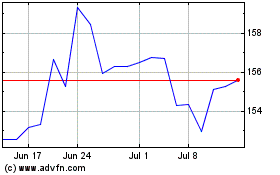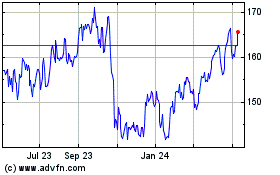By Bradley Olson and Nicole Friedman
Shareholders at Exxon Mobil Corp. and Chevron Corp. narrowly
voted down resolutions calling for stress tests to determine the
risk that efforts to curb climate change pose to their
businesses.
Despite the defeat, the proposals drew more support than any
contested climate-related votes in the history of the two biggest
U.S. oil and gas companies. Preliminary results showed 41% support
from Chevron investors that cast ballots and 38% support at Exxon,
an indication that more mainstream shareholders like pension funds,
sovereign-wealth funds and asset managers are starting to take more
seriously the threat of a global weaning from fossil fuels.
The number of shareholders supporting the climate-risk measures
"is significant, and it will continue to grow," said Beth Richtman,
investment manager at the California Public Employees' Retirement
System, which manages about $290 billion. Calpers owns about $1
billion worth of Exxon shares and approximately $600 million in
Chevron stock.
"There's a groundswell of share owners who are going to keep
pushing this forward," she said. "We need to see them rise to the
realm of best practices in terms of climate risk reporting, and
we're not there yet."
While the shareholder votes aren't binding, supporters of the
measures declared victory even in defeat after the oil companies'
annual shareholder meetings Wednesday.
"You have to read this as a shot across the bow of the
industry," said Andrew Logan, director of the oil and gas program
at Ceres, a Boston-based nonprofit group that advocated for the
proposals.
Exxon and Chevron had fought to keep the measures off the
ballot, a push that the U.S. Securities and Exchange Commission
rebuffed.
Separately on Wednesday, the White House said it planned to
propose a new rule that companies with federal contracts must
disclose whether they share information about the risks that a
changing climate could pose to their operations, as well as their
goals to reduce greenhouse gas emissions.
That rule, expected to be completed this fall, would affect most
federal contracts. The U.S. government is a major buyer of oil
products, including jet fuel and diesel used by the military.
Exxon Chief Executive Rex Tillerson said Wednesday the company
includes in its energy outlook a proxy cost on carbon.
"It's really the only way we know to accommodate in our
financial decision-making the impacts of future policies that are
yet to be formulated," he said. He added that most Exxon projects
are either too short-term or too large for the theoretical cost of
carbon they use in planning purposes to affect their
decision-making.
Exxon has also noted it published a 2014 report on managing
climate risks that said none of the company's oil and gas holdings
are threatened by a global push to reduce carbon emissions.
Chevron told investors that the proposed climate measure was
flawed. Efforts to limit warming could allow some energy producers,
such as those who sell natural gas, to benefit while others fall
out of favor, including coal-mining companies, Chevron said. The
company is a large producer of natural gas and factors in a
theoretical future price of carbon when deciding which projects to
sanction, making a stress test unnecessary, the company said.
"We don't think this proposal will advance our thinking,"
Chevron Chief Executive John Watson said Wednesday.
Measures of this sort have been pushed in prior years by
environmental groups and activist investors, but now more
traditional shareholders are putting their muscle behind the
proposals as concern spreads over the effect that policies to
mitigate climate change could have on energy company
financials.
Those who led the filing of the Exxon resolution were the Church
Commissioners for England and the New York State Common Retirement
Fund, along with others. The lead filers for the Chevron resolution
were Hermes Equity Ownership Services and Wespath Investment
Management, a division of the United Methodist Church.
Investors representing more than $10 trillion in assets pledged
to support the climate proxy measures, which assert that Exxon,
Chevron and other big oil companies should be transparent about how
their drilling prospects would suffer if the world turned away from
carbon-intensive fuels, including crude oil.
The New York State Common Retirement Fund, Norway's
sovereign-wealth fund, the Church of England, Calpers and others
actively campaigned for the proposals.
In December, nearly 200 countries pledged in Paris to hold the
rise in average global temperatures to less than 2 degrees Celsius
above preindustrial levels. This is the yardstick many shareholder
resolutions have used to urge the companies to take greater action
and show how such a goal will affect their business units.
Supporters of that effort say more investors want to see how
companies are preparing for climate change impacts. A stress-test
measure at Occidental Petroleum Corp. received 49% of votes, and
similar proposals passed overwhelmingly last year at two other big
oil companies, BP PLC and Royal Dutch Shell PLC.
In a report on climate released this month, Total SA, the French
energy company, said it has reduced activity in Canada's oil-sands
region and is avoiding Arctic exploration over concerns that some
fossil fuels will have to stay in the ground if the goals set forth
in Paris are achieved.
ConocoPhillips and Statoil ASA have issued projections that
global oil demand could fall significantly by 2040 if measures to
reduce climate risk are put in place. By contrast, Exxon's
projection for global oil demand in that year is 28% higher than
peers' forecasts.
"There's an awful lot of shareholder disquiet about how Exxon is
approaching climate change," said Edward Mason, head of responsible
investment for the Church Commissioners for England, which manages
the assets of the Church of England.
At the Exxon annual meeting, shareholders did approve one
shareholder proposal, giving investors greater power to propose
director candidates. None of eight proposed shareholder measures
passed at Chevron's meeting.
--Amy Harder contributed to this article.
Write to Bradley Olson at Bradley.Olson@wsj.com and Nicole
Friedman at nicole.friedman@wsj.com
(END) Dow Jones Newswires
May 25, 2016 19:11 ET (23:11 GMT)
Copyright (c) 2016 Dow Jones & Company, Inc.
Chevron (NYSE:CVX)
Historical Stock Chart
From Mar 2024 to Apr 2024

Chevron (NYSE:CVX)
Historical Stock Chart
From Apr 2023 to Apr 2024
